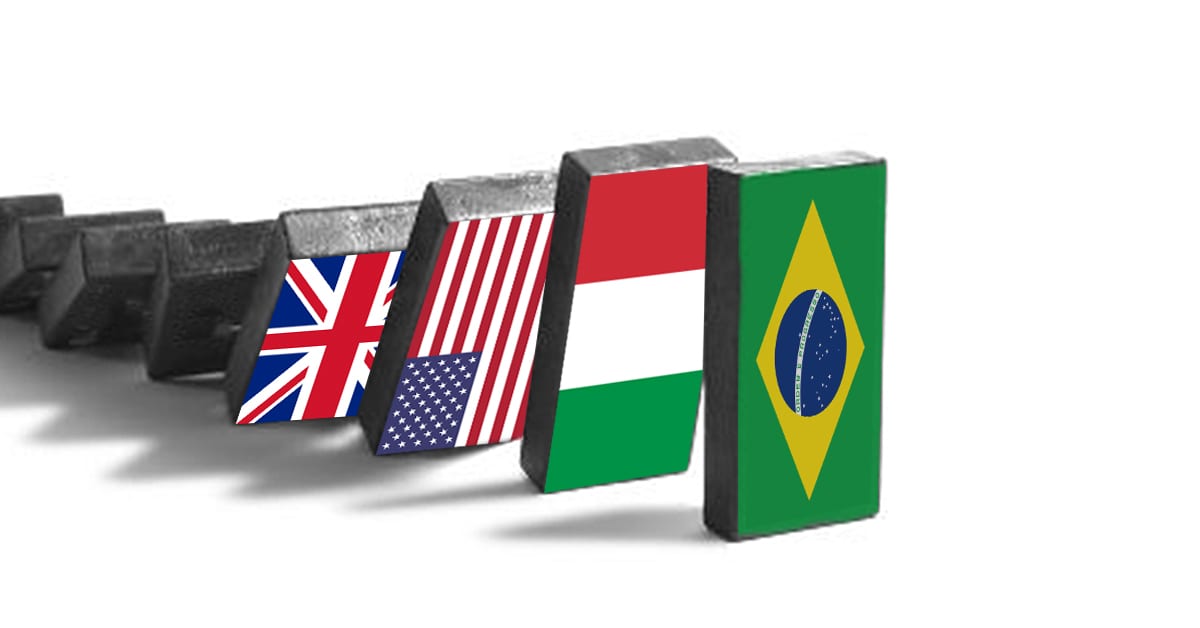Nathan Gardels is the editor-in-chief of Noema Magazine. He is also the co-founder of and a senior adviser to the Berggruen Institute.
Democratic establishments across the world continue to fall like dominoes under waves of popular anger and resentment against the decay of institutions riddled with corruption or captured by organized special interest. On Sunday, it was Brazil’s turn. Jair Bolsonaro, a right-wing fanatic known as “the Trump of the tropics,” won the presidential election.
The pattern is clear: when an unresponsive elite forsakes average citizens in a system legitimated by popular sovereignty, demagogues who fashion themselves as tribunes of the people ride the rage to power. To add danger to decay, the fevered insurgency throws the baby out with the bathwater, assaulting the very integrity of institutional checks and balances that guarantee the enduring survival of republics. When magical thinking, incompetence and xenophobic passions take hold, all that was painstakingly built is destroyed. The revolt against a moribund political class transmutes into a revolt against democratic governance itself.
One thing is clear by now. We are beyond the point of going back to the old ways through the normal rotation of election cycles. All hope now rests on the capacity to renovate democracy when the next turn of the zeitgeist arrives.
Former Brazilian President Fernando Henrique Cardoso — whose assassination Bolsonaro once called for — describes what lay behind the political earthquake. “Bolsonaro surfed a tsunami of popular anger and despair that swept away the entire Brazilian political system, along with the old party leaders,” he writes this week from São Paulo. “He was able to do so because of the people’s growing suspicion that representative democracy is incapable of delivering what they need. This disaffection was compounded by a brutal economic recession in Brazil, the longest in our history.”
As elsewhere, the participatory power of social networks and the disruption of old social patterns played a big role. “Society has lost its former cohesion. Political parties and trade unions, which once gave meaning to political projects and ideologies, no longer draw support and solidarity,” Cardoso says. “As a result, people’s political choices are often guided by messages generated by their social networks. And when the corruption of political parties, statesmen and leaders is exposed, anger against politicians overshadows all other concerns. That is exactly what happened here in Brazil.”
Marking the end of an era that began three decades ago after military rule, Cardoso says, “Democracy was the overriding cause for my generation. It is always a work in progress. Today, it may be at risk in Brazil, as it is elsewhere. If human rights and the rule of law are threatened, our obligation will be to stand up and resist.”
Vinicius Mariano de Carvalho sees Brazil’s incomplete transition to democracy from brutal military rule as a key cause of the present crisis. “Brazil’s ‘coalitional presidentialism,’” he writes, “which is when a president’s party lacks a majority in the lower house of Parliament and must form a coalition with other parties, created the paradox of a strong president who is nevertheless held hostage by Congress. It was only a matter of time that this tension, which originated from the post-dictatorial political model, would create a fracture in Brazil’s democracy.” As a result of the perpetual paralysis and chaos this system produced, he laments, “A considerable portion of the Brazilian population is now expressing nostalgia for the military regime.”
Rosana Pinheiro-Machado agrees that Brazil’s institutional weakness is a cause of the present upheaval. “Much of what we are seeing today is not new. Brazil’s democracy has always been fragile, both institutionally and culturally,” she writes from São Paulo. “Even after the country’s military dictatorship ended in 1985, authoritarian measures and political instability persisted, along with far-right and ultra conservative ideologies. Corruption runs deep. Two presidents have been impeached in the past 25 years.”
As an anthropologist, she also sees some deeper causes. “Culturally, Brazil is deeply conservative,” she notes. “It is home to the largest Catholic community in the world, and there has been a rapid increase in the number of evangelical neo-Pentecostal churches over the last two decades. Christian values concerning family, gender and sexuality still remain deeply rooted in Brazilian culture.”
This cultural conservatism, she continues, exists alongside long-festering realities of Brazilian society. “In addition,” she continues, “violence is common in Brazil. Police violence has been especially prevalent in poor black communities. The scholar and politician Abdias do Nascimento refers to this violence as the ‘genocide of black Brazilians.’ Today, 71 percent of homicides occur among black people, as the latest ‘violence map’ shows. It is among the most dangerous places in the world for women, indigenous groups and gay and trans people.”
Finally, Tai Nalon addresses the role Facebook’s WhatsApp played in Brazil’s election. Using data crowdsourced from more than 6,000 WhatsApp users, she reports that the fact-checking service she leads, Aos Fatos, documented “more than 700 false or misleading posts being shared on the app.” She points to these rumors as having “distorted at least four key categories of information: statements by political candidates, news of electronic voting and legislation, the nature of protests and the outcomes of opinion polls.” She writes, “These messages were largely aimed at right-leaning political groups, Catholic and evangelical churches, trade and business associations, and military groups.”
This week, the annual $1 million Berggruen Prize for Philosophy and Culture was awarded to Martha Nussbaum. One of Nussbaum’s greatest contributions, relevant to the causes behind Brazil’s turmoil, is the capabilities approach developed with Nobel Prize-winning economist Amartya Sen. The main idea is that well-being and progress should not be measured by income alone but also by the quality of health, education and cultural access.
This was produced by The WorldPost, a partnership of the Berggruen Institute and The Washington Post.





